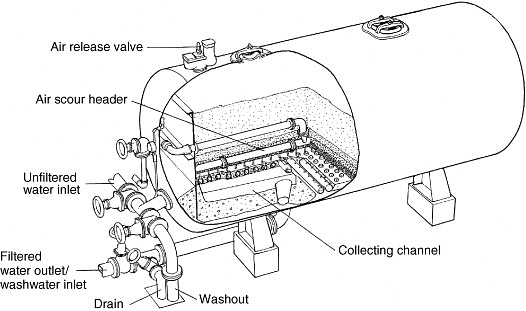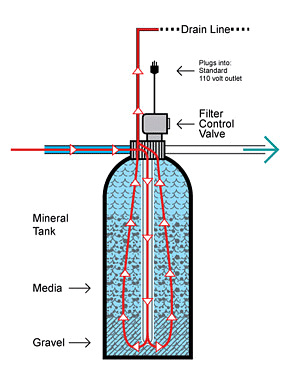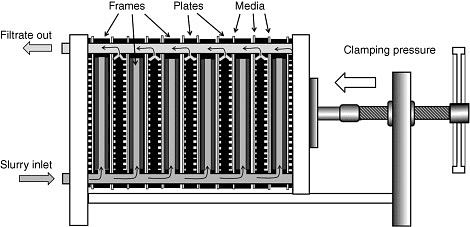Pressure Filter | Civil Engineering Optional Notes for UPSC PDF Download
Pressure filters play a crucial role in water treatment, and they have some distinct features compared to rapid gravity filters. Let’s explore the details:
- Pressure Filters:
- Construction and Containment:
- Pressure filters are housed within a steel pressure vessel.
These vessels can be either cylindrical (arranged horizontally or vertically).
Filter Media Collection and Distribution:
Perforated pipes or a steel plate with nozzles are used for collecting filtered water and distributing washwater and air scour.
Bed Design and Eliminating Dead Areas:
- To ensure even washing and eliminate stagnant zones, vertical plates may be welded inside the vessel.
- This creates a rectangular sand bed within the filter.
- Media Depth and Uniform Distribution:
- The entire vessel is filled with filter media (such as sand), ensuring uniform depth distribution.
Air Release Valve:
A release valve is installed at the highest point to release trapped air.
Transportation Limitations:
Filter diameters are typically capped at 3–4 meters, and lengths/heights are limited to about 12 meters due to transportation constraints.
Pressure filters are essential for achieving clean water by removing contaminants. Their design and operation ensure efficient filtration and reliable performance in water treatment processes.

Pressure Filter Backwashing:
- The backwashing procedure for pressure filters closely resembles that of open rapid gravity filters.
- Key components include a bellmouth and pipe for removing dirty washwater in vertical filters.
- For most horizontal filters, a single vertical plate near one of the dished ends facilitates washwater removal.
- Larger filters may require a central washout channel formed by two vertical plates.

Advantages of Pressure Filters:
Preserving Raw Water Pressure:Unlike open rapid gravity filters, pressure filters do not lose excess raw water pressure during filtration.
Approximately 3 meters of head may be lost due to friction through the sand bed and inlet/outlet fittings.
This includes an allowance for dirt loss (about 1.5–1.8 meters).
Interposing on Pipelines:
Pressure filters can be interposed on pumped or gravity pipelines without significant pressure loss.
Air binding (negative head) should not occur if the media pressure remains above upstream points where air could enter.
Chemical Treatment Considerations:
Coagulation and Flocculation:
When chemical treatment (e.g., coagulation) is required, chemicals are injected and mixed under pressure.
Flocculation must be hydraulically carried out in pressure vessels fitted with baffles.
Contact Tanks for Disinfection:
Similar principles apply when a contact tank is needed downstream for disinfection.
Flow Control in Pressure Filter Installations:
Individual Flow Control Absence:Pressure filter installations often lack individual flow control mechanisms.
As a result, each filter operates as a declining rate filter during part of its filtration cycle.
Flow tends to concentrate through the clean, newly washed filters.
- Outlet Flow Restriction Options:
An orifice plate can be installed in the outlet to restrict flow.
However, a better option is to modulate the outlet valve using signals from a flowmeter on each filter.
This ensures that the flow equals the total flow divided by the number of filters in service.
Head Loss Monitoring and Termination Criteria:
When employing flow controllers, head loss can be monitored on individual filters.
Filter runs can be terminated based on headloss, length of filter run, or turbidity breakthrough.

Pressure Filter Design and Fabrication:
Pressure filters are essential components in water treatment systems.
Here are some key considerations for their design and fabrication:
Condensation Issues:Condensation on the outside of filter tanks is a common problem.
It can lead to corrosion of the steel shell and staining of the floor below.
Pressure Limitations:
Steel pressure filters typically operate at pressures not exceeding 80 meters (m) head of water.
This pressure level is usually sufficient for most distribution systems.
Beyond this pressure, the thickness of plates used for the steel shell increases significantly, leading to higher costs.
Application Restrictions:
Pressure filters are preferred for small plants where breaking the hydraulic gradient is not feasible.
Common applications include iron and manganese removal from groundwaters, direct filtration of stored water, and GAC adsorption for organic removal.
|
350 videos|464 docs|2 tests
|




















